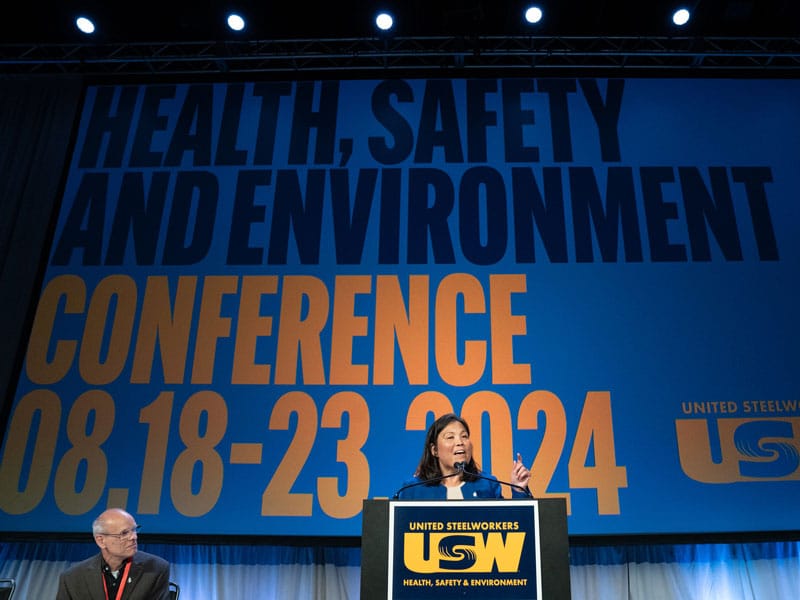Worker Involvement Drives Tony Mazzocchi Center Training
For 28 years, the USW’s Tony Mazzocchi Center (TMC) has received Nuclear Worker Training Program grants from the National Institute of Environmental Health Sciences (NIEHS) and the U.S. Department of Energy (DOE) to train current and future atomic workers.
Atomic workers have specialized training so they can protect themselves and the public from exposure to hazardous and radioactive substances being removed from former nuclear weapons sites, used in the production of nuclear fuel and deposited in an underground salt repository in Carlsbad, N.M.
The Oil, Chemical & Atomic Workers (OCAW) union first applied for the grant in 1992 because it represented thousands of workers in DOE’s nuclear complex. After the union underwent two more mergers, TMC was created and continued applying for and administering the grant.
Ashlee Fitch, TMC’s director, develops relationships with NIEHS and DOE, and explains to officials that the Occupational Safety and Health Administration (OSHA) can only do so much to improve workplace conditions; additional health and safety training is needed as well to help prevent incidents from occurring.
The TMC re-applied for the five-year grant last fall, and requested funds to maintain its training program and to protect members against emerging health and safety issues like opioid addiction, Fitch said. A decision on the amount of funding will come this May.
“NIEHS and DOE know that worker-led health and safety instruction and worker involvement in this training help convey that health and safety is important and that training can help change happen at the site level,” she said.
Local union involvement
Atomic locals develop relationships with their contractors, see which resources are needed to protect their members, and advocate for TMC training. Some contractors like computer-based training because the DOE reimburses them for it, but the locals point out the benefits of person-to-person and hands-on training: People retain what they learn better because they are active participants in their learning.
“I think that members and their local unions also understand the need for the next generation of workers to be aware of their rights and the health and safety hazards at the sites. That’s their motivation for doing health and safety training in their communities,” Fitch said.
Atomic locals at Portsmouth, Ohio, Oak Ridge, Tenn., and Erwin, Tenn., have conducted health and safety classes in their communities to help prepare future employees for careers at their sites.
More classes offered
Later this year, the TMC is conducting its second class for nuclear health and safety representatives. The first one, held last June, was successful.

“I think this training will play a key role for health and safety activists across the DOE complex to get together, learn about issues, and strengthen their involvement in health and safety issues at the site level,” Fitch said.
TMC is also offering two newer training programs on opioid addiction and mental health.
“We know these programs could go unaddressed by OSHA or appropriate regulatory agencies,” Fitch said, “but we can address these issues in health and safety training and collective bargaining agreements.”
She said the mental health training focuses on the stigmatization of mental and emotional disorders, occupational risk factors like “presenteeism” ( being physically present but unable to perform job duties because of illness, injury or other conditions), fatigue, harassment and bullying. These risk factors can be addressed using the Systems of Safety or the collective bargaining agreement, Fitch said.
This fall, TMC will be conducting pilot trainings on how workers, their sites and facilities, and their communities can be prepared in case of fires, flooding, tornadoes and other natural disasters, Fitch said. The TMC is currently working on the preparedness guidebook.
Any local union interested in TMC training can contact the center at 412-562-2359 or email: webmaster@uswtmc.org.
By clicking Sign Up you're confirming that you agree with our Terms and Conditions.
Recent News Articles
Want to Learn More?
See how the USW is making a real difference in our communities and our workplaces.

